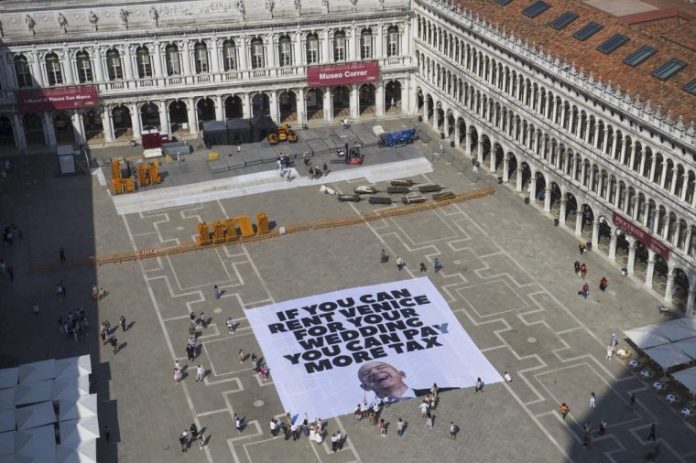Venice residents have spoken out against Amazon founder Jeff Bezos getting married in their city. They’re worried about more tourists and want better public services and affordable housing instead of hosting VIP guests.
The ceremony is expected to take place on June 26-28 and will be attended by around 200 guests, including US President Donald Trump’s daughter Ivanka Trump and her husband Jared Kushner.
Greenpeace has joined the protests, unfurling a huge banner in St. Mark’s Square with the demand: “If you can rent Venice for your wedding, you can pay more taxes.”
According to rumours, the wedding will cost a staggering $16 million (£12 million), of which $1 million (£744,880) will be spent on flowers and decorations alone. Rosa Salva, Venice’s oldest pastry chef, will prepare the desserts for the celebration.
Greenpeace also emphasised that the action was aimed at drawing attention to the fact that many billionaires pay relatively low taxes, while their environmental and social contributions are often minimal and their lifestyles exacerbate the climate crisis.
Crocodiles vs. Bezos
Some protesters even said they would throw inflatable crocodiles into the canals leading to the Scuola Grande della Misericordia to prevent rich and famous guests arriving in gondolas.
“Bezos on the run is a crazy victory for a small group of people without money who have stood up to one of the richest men on the planet,” protester Tommaso Cacciari told The Times.
The billionaire’s yacht, which flies the Cayman Islands flag, is anchored off an island on the Adriatic coast of Croatia. It will arrive in the Venetian lagoon this week accompanied by the support vessel Abeona, another mega-yacht equipped with a helipad.
Protesters are preparing a hostile reception for the couple and 250 guests. Various activist groups have united under the slogan “No place for Bezos,” a reference to the billionaire’s space exploration project, Blue Origin. They say the wedding symbolises how Venice has sold its soul to tourism at the expense of local residents, who face a severe housing shortage, the closure of essential services and the replacement of local businesses with souvenir shops.
